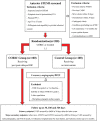Effect of comprehensive remote ischemic conditioning in anterior ST-elevation myocardial infarction undergoing primary percutaneous coronary intervention: Design and rationale of the CORIC-MI randomized trial
- PMID: 29726013
- PMCID: PMC6489915
- DOI: 10.1002/clc.22973
Effect of comprehensive remote ischemic conditioning in anterior ST-elevation myocardial infarction undergoing primary percutaneous coronary intervention: Design and rationale of the CORIC-MI randomized trial
Abstract
Remote ischemic conditioning (RIC) applied during or after ST-segment elevation myocardial infarction (STEMI) is currently the most promising adjuvant therapy to reduce reperfusion injury. Recent animal studies showed that RIC may help the myocardium recover if applied daily during the month after STEMI. The Comprehensive Remote Ischemic Conditioning in Myocardial Infarction (CORIC-MI) trial is a single-center randomized controlled study in which 200 patients undergoing primary percutaneous coronary intervention (PPCI) for anterior STEMI will be randomized in a 1:1 ratio into comprehensive RIC (CORIC) or no intervention (control) groups. CORIC consists of per-RIC (5 cycles of 5-minute ischemia and 5-minute reperfusion of the lower limb immediately after randomization and before reperfusion), post-RIC (5 cycles of 5-minute ischemia and 5-minute reperfusion of the lower limb immediately post-PPCI), and delayed RIC (5 cycles of 5-minute ischemia and 5-minute reperfusion of the lower limb once daily on 2-28 days). Primary endpoint is left ventricular ejection fraction assessed by cardiac magnetic resonance imaging at 30 days. Major secondary endpoints include infarct size and left ventricular volume assessed by cardiac magnetic resonance imaging at 30 days, left ventricular ejection fraction assessed by echocardiography, and major adverse cardiovascular events up to 12 months. This report presents the baseline characteristics of 93 patients (CORIC group, n = 49; control group, n = 44) enrolled into the study as of March 31, 2018. The CORIC-MI trial aims to test the hypothesis that CORIC will improve cardiac function and remodeling in patients with anterior STEMI undergoing PPCI.
Keywords: Primary Percutaneous Coronary Intervention; Remote Ischemic Conditioning; Reperfusion Injury; ST-Segment Elevation Myocardial Infarction.
© 2018 Wiley Periodicals, Inc.
Conflict of interest statement
The authors declare no potential conflicts of interest.
Figures

Similar articles
-
Remote ischemic post-conditioning of the lower limb during primary percutaneous coronary intervention safely reduces enzymatic infarct size in anterior myocardial infarction: a randomized controlled trial.JACC Cardiovasc Interv. 2013 Oct;6(10):1055-63. doi: 10.1016/j.jcin.2013.05.011. JACC Cardiovasc Interv. 2013. PMID: 24156966 Clinical Trial.
-
Remote ischemic conditioning in ST-elevation myocardial infarction as adjuvant to primary angioplasty (RIC-STEMI): study protocol for a randomized controlled trial.Trials. 2015 Sep 8;16:398. doi: 10.1186/s13063-015-0937-1. Trials. 2015. PMID: 26350480 Free PMC article. Clinical Trial.
-
Remote ischemic conditioning reduces myocardial infarct size and edema in patients with ST-segment elevation myocardial infarction.JACC Cardiovasc Interv. 2015 Jan;8(1 Pt B):178-188. doi: 10.1016/j.jcin.2014.05.015. Epub 2014 Sep 17. JACC Cardiovasc Interv. 2015. PMID: 25240548 Clinical Trial.
-
Effect of remote ischemic preconditioning in patients with STEMI during primary percutaneous coronary intervention: a meta-analysis of randomized controlled trials.Rev Cardiovasc Med. 2020 Mar 30;21(1):103-112. doi: 10.31083/j.rcm.2020.01.10. Rev Cardiovasc Med. 2020. PMID: 32259908
-
Remote ischemic conditioning during primary percutaneous coronary intervention in patients with ST-segment elevation myocardial infarction: a systematic review and meta-analysis.J Cardiothorac Surg. 2019 Jan 21;14(1):14. doi: 10.1186/s13019-019-0834-x. J Cardiothorac Surg. 2019. PMID: 30696461 Free PMC article.
Cited by
-
Cardioprotection of Repeated Remote Ischemic Conditioning in Patients With ST-Segment Elevation Myocardial Infarction.Front Cardiovasc Med. 2022 May 26;9:899302. doi: 10.3389/fcvm.2022.899302. eCollection 2022. Front Cardiovasc Med. 2022. PMID: 35722122 Free PMC article.
-
Early Immunological Effects of Ischemia-Reperfusion Injury: No Modulation by Ischemic Preconditioning in a Randomised Crossover Trial in Healthy Humans.Int J Mol Sci. 2019 Jun 13;20(12):2877. doi: 10.3390/ijms20122877. Int J Mol Sci. 2019. PMID: 31200465 Free PMC article. Clinical Trial.
-
Circulating mediators of remote ischemic preconditioning: search for the missing link between non-lethal ischemia and cardioprotection.Oncotarget. 2019 Jan 4;10(2):216-244. doi: 10.18632/oncotarget.26537. eCollection 2019 Jan 4. Oncotarget. 2019. PMID: 30719216 Free PMC article. Review.
-
Chronic remote ischemic conditioning for cardiovascular protection.Cond Med. 2019 Aug;2(4):164-169. Cond Med. 2019. PMID: 32313876 Free PMC article.
References
-
- Zijlstra F, Hoorntje JC, de Boer MJ, et al. Long‐term benefit of primary angioplasty as compared with thrombolytic therapy for acute myocardial infarction. N Engl J Med. 1999;341:1413–1419. - PubMed
-
- Skyschally A, Gent S, Amanakis G, et al. Across‐species transfer of protection by remote ischemic preconditioning with species‐specific myocardial signal transduction by reperfusion injury salvage kinase and survival activating factor enhancement pathways. Circ Res. 2015;117:279–288. - PubMed
-
- Gumina RJ, Buerger E, Eickmeier C, et al. Inhibition of the Na(+)/H(+) exchanger confers greater cardioprotection against 90 minutes of myocardial ischemia than ischemic preconditioning in dogs. Circulation. 1999;100:2519–2526, 2469–2472. - PubMed
-
- Zhao ZQ, Corvera JS, Halkos ME, et al. Inhibition of myocardial injury by ischemic postconditioning during reperfusion: comparison with ischemic preconditioning [published correction appears in Am J Physiol Heart Circ Physiol. 2004;286:H477]. Am J Physiol Heart Circ Physiol. 2003;285:H579–H588. - PubMed
Publication types
MeSH terms
Grants and funding
LinkOut - more resources
Full Text Sources
Other Literature Sources

